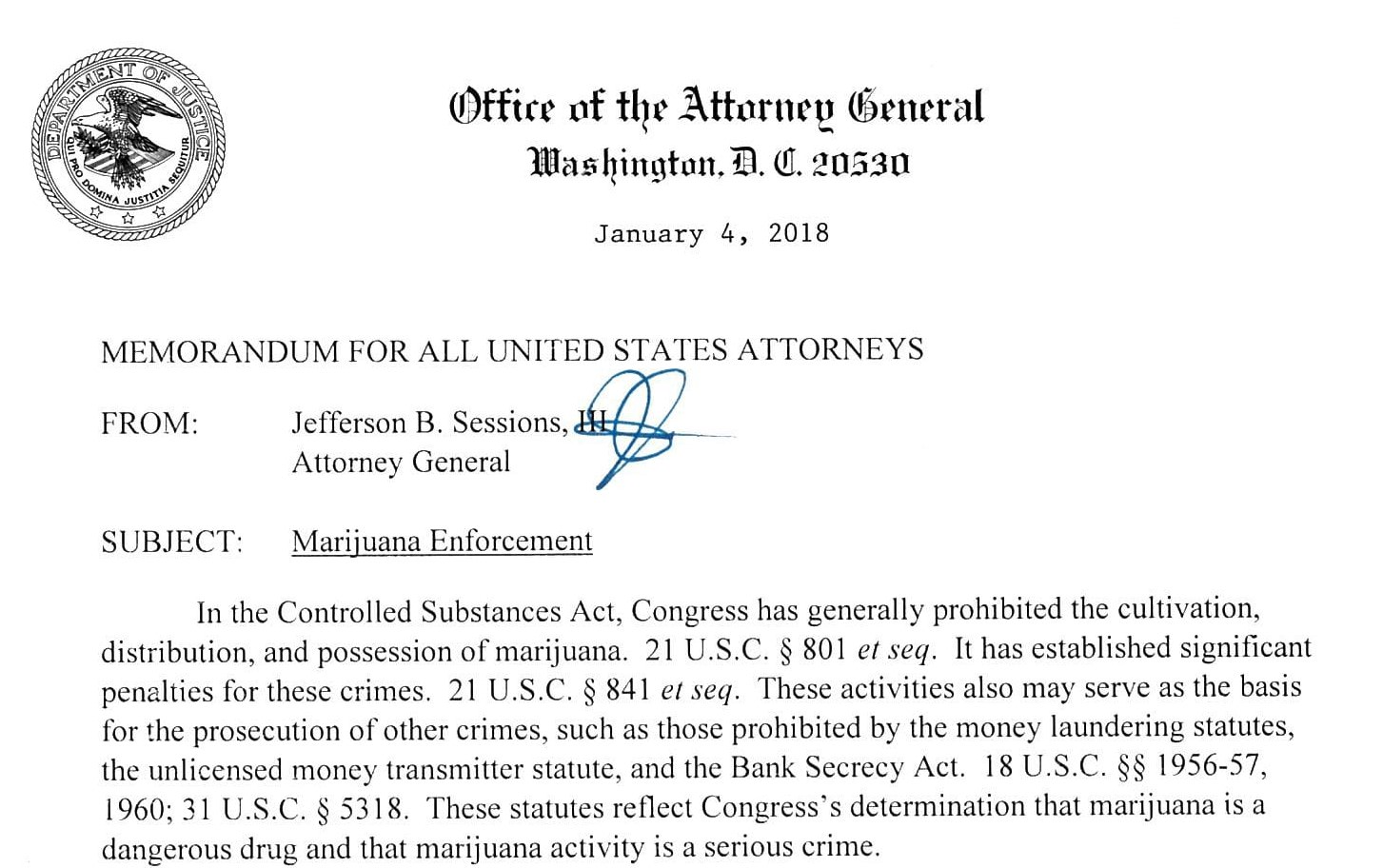How Does Federalism Impact The Controlled Substance Act

When Attorney General Jeff Sessions announced last calendar week that he was rescinding the 2013 Cole Memorandum, marijuana policy was in one case again back on the national stage. The Cole Memo, issued by the Obama Justice Department, stated that those using, producing, or selling marijuana in compliance with robust state regulations would not be targeted by federal prosecutors. With the Cole Memo gone, in that location was renewed business organization that state-level marijuana law reform could exist undone by federal enforcement of the Controlled Substances Human activity (CSA).
The reaction against Sessions's action was swift. Republican Senator Cory Gardner took to the floor of the Senate, condemning Sessions's decision as a broken promise. Senator Gardner also appear that that he would cake all Justice Department nominations until the Attorney General made good on his pledge to defer to the states on marijuana policy. Others on both sides of the alley made similar calls on Sessions to respect the will of the voters in the 29 states that made marijuana legally available for at least some adults.
While marijuana policy has been seen primarily as a federalism battlefield – calling into question the appropriate division of authorization between the state and federal governments to regulate the drug – it is now becoming articulate that it is as much well-nigh separation of powers as it is most federalism. Like Dorothy at the finish of the Wizard of Oz, Congress is now realizing that information technology had the ability to fix matters all along. While the Justice Department has broad authority to enforce federal constabulary, it is obviously up to the Congress to determine what that police is. Sessions'due south deportment have spurred Congress to reassert its authorization in this area and members of both houses are now considering what options remain available to them.
Near immediately, Congress could extend the Rohrabacher-Blumenauer Amendment that since 2014 has prohibited the Department of Justice from using allocated funds to interfere in land medical marijuana laws. On January 11th California Representative Barbara Lee introduced a bill that would make the Amendment permanent, apply it to both medical and medical marijuana laws, and prohibit both criminal and civil enforcement actions against those interim in compliance with state marijuana laws.
Such a fix could preclude an firsthand crackdown, merely it would only accept the effect of restoring the tenuous status quo ante – a earth in which thousands of businesses and millions of people were engaged every 24-hour interval in bear that remains felonious under federal law even while it is authorized and regulated by the states. So long as this conduct remains illegal under federal law, there are significant negative consequences for both businesses and individuals, even if the federal government is prohibited from enforcing the Controlled Substances Human activity. Businesses have trouble obtaining basic banking services and are taxed at confiscatory rates equally a issue of a federal police force that denies them almost all business deductions. Individuals risk losing their jobs, parental rights, or government benefits by engaging in carry that remains criminal in the eyes of the law.
Thus, if Congress truly wishes to empower u.s. to explore alternatives to marijuana prohibition, a mere ban on federal enforcement will not suffice; rather, it must modify the legal condition of the underlying conduct. Senator Cory Booker'south Marijuana Justice Act would remove marijuana from the CSA entirely, take steps to undo the damage wrought by the discriminatory enforcement of marijuana laws over the years, and create a path by which those imprisoned for marijuana crimes could have their convictions overturned or their sentences lessened. The SMART Enforcement Act would make the CSA inapplicable in those states with robust country-wide marijuana regulations, leaving information technology in place simply in those states choosing to be governed by information technology.
Ironically, Sessions's try to crack downwardly on states moving abroad from prohibition is having the effect of focusing free energy and attention on alternatives to prohibition at the federal level.
Criminal Justice, National Security and Civil Liberties, Prison house Policy/Incarceration, Separation of Powers and Federalism
How Does Federalism Impact The Controlled Substance Act,
Source: https://www.acslaw.org/expertforum/youve-always-had-the-power-marijuana-federalism-and-separation-of-powers/
Posted by: kennedyhimantand.blogspot.com


0 Response to "How Does Federalism Impact The Controlled Substance Act"
Post a Comment